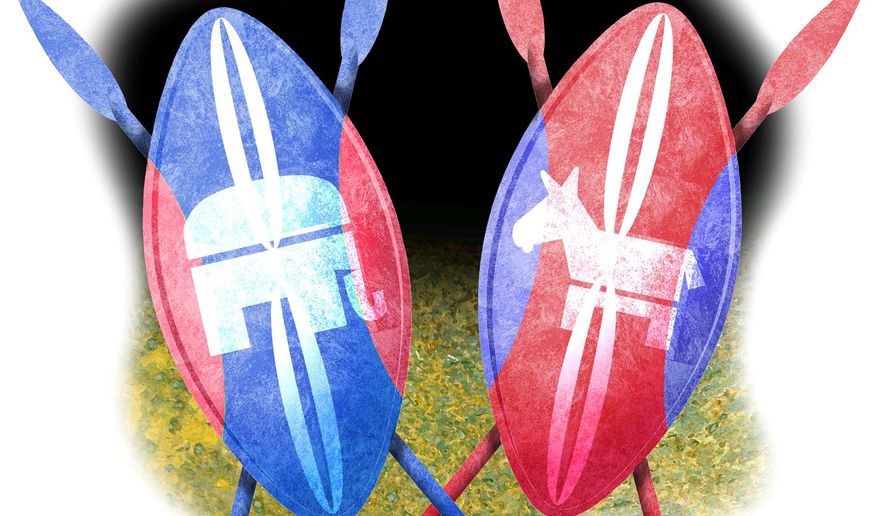OPINION:
My grandfather, a buttonhole maker, had three loyalties — family, his union and the Democratic Party. He believed a man’s first calling is to be a provider, his union enabled that role and the party of Al Smith and Franklin Roosevelt was the workingman’s champion.
He could not give great thought to New Deal policies — the efficacy of Fair Trade Laws that made his appliances more expensive or Secretary of State Hull’s freer trade agenda that ultimately decimated his apparel industry. The details were beyond the grasp of someone with a grade-school education.
His politics were tribal, and he embraced politicians who often worked against his interests.
My father, a high school graduate who spent most of his career on the first rung of management supervising salesmen in the now-defunct door-to-door life insurance business — put first family, his company and the party of Dwight Eisenhower and Richard Nixon, because he wanted to identify with the class of his superiors at corporate headquarters.
He was anti-union, for low taxes and strict curbs on government spending, because that was in line with the views of the managerial class and GOP agenda.
Ironically, three of his children owe their educations and considerable prosperity to progressive institutions and policies — the State University of New York and generously subsidized tuition.
These days, we like to think a better-educated citizenry weighs policy prescription and the performance of incumbents on everything from trade and immigration to health care and education, and aligns with candidates and parties based on an earnest appraisal of what they offer. And the combined wisdom of an engaged electorate will prudently steer our government.
In a Democracy for Realists, political scientists Christopher Achen and Larry Bartels offer significant evidence that thinking is wrongheaded. Instead, voters choose political parties and candidates based on social identities and partisan loyalties and then adjust perceptions of facts on the ground and views on public policy to match party loyalties.
Nearly 90 percent of Republicans are happy with the economy as it is now performing but fewer than 40 percent of Democrats do, and presidential approval ratings through both the Obama and Trump years have been little correlated with fluctuations with broader perceptions of economic conditions.
This is hardly surprising. Few voters have time to understand the machinations of economics and government policy and rely on leaders who share their values to be their guide.
The trick to winning elections consistently is to build a big tribe and then win enough of the 15 million swing voters with very expensive high-tech marketing that profiles individuals through surveys, purchases and web-surfing habits, and then bombard them with surgically targeted social media messaging, videos, direct mail and walk and phone contact for registration, persuasion and turnout.
The really interesting elections occur when presidential candidates steal major segments of the other party’s tribe — Reagan garnering blue collar union votes, Bill Clinton’s inroads with women and Barack Obama’s outsized success with younger voters and college grads — and sometimes keep them for their party permanently.
To build a tribe in an ethnically diverse, gender role-evolving, post-industrial America, parties can’t clutch to binary divisions like workers vs. management but instead pick big villains that can unite fragmented elements of the electorate.
Mr. Trump characterized undocumented immigrants — most recently the DACAs — as criminals, but the statistical evidence indicates they are not more inclined toward crime. The Obama-Clinton-Warren et al. axis practices identity politics and harpoons white male culture for inequality and injustice.
Candidates and public officials can advocate the most irresponsible policies. For example, failing to accept millions more immigrants will smother our economy. The birth rate of native-born Americans is too low to sustain our labor force and support the elderly.
The Green New Deal would make U.S. cities and homes uninhabitable. By 2030 or even 2040, does anyone honestly believe electric vehicles could be competent and plentiful enough to replace all the petroleum-powered trucks that supply Manhattan and other cities with daily necessities or every gas furnace in America could be replaced by heat pumps?
In the absence of reason, voter frustration encourages new demagogues to oust incumbents.
Virtually all Elizabeth Warren’s “plans” are premised on scapegoats — big banks, business and billionaires.
It’s Latin America with ballots for rifles but self-destructive just the same.
If you don’t like Mr. Trump, wait and see what the next man — or woman — on a white horse does.
• Peter Morici is an economist and business professor at the University of Maryland, and a national columnist.




Please read our comment policy before commenting.